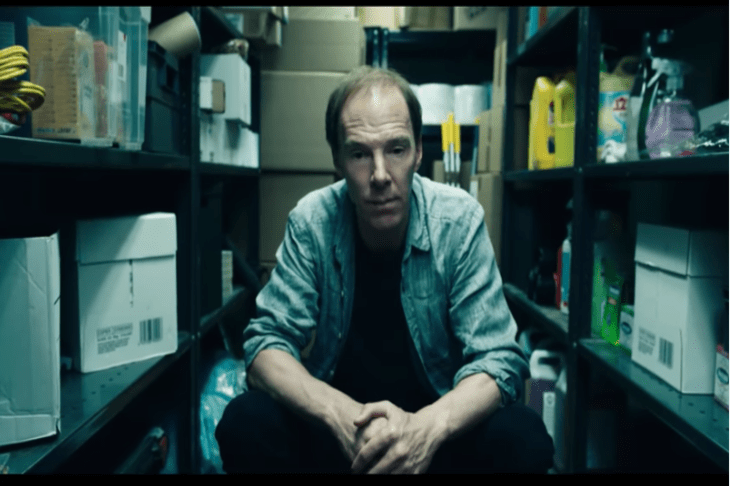It starts with a balding weirdo locked in a cupboard ranting about mythological abstractions. This is Dominic Cummings, the key figure in Channel 4’s Brexit film, The Uncivil War, and the opening scene is designed to overcome a major hurdle. How to make the audience – half of whom loathe Brexit – feel sympathy for the man credited with making it happen. Trapping him in a neon-lit cell with only his thoughts for company turns him into a tormented martyr.
Next we see him being sized up as a potential director of the Leave campaign. Deep in his guts he loathes politicians – and the entire Westminster establishment – especially David Cameron and his communications chief, Craig Oliver. ‘A position,’ says Cummings, ‘held by a long history of bastards.’ Cummings in turn is hated by Conservative grandees. ‘He’s mental,’ says Craig Oliver. ‘An egoist with a wrecking ball’.
A man detested by senior Tories can’t be all bad.
Velvety-voiced Benedict Cumberbatch offers a memorably brilliant portrait of Cummings. He’s a moody, sad-faced ascetic who wears jumble-sale clothes and spends his free time reading Thucydides. His preferred occupation is working on a farm. But when summoned to rescue his country, he springs into action. He’s a man of destiny, like Cromwell, and a man of ideas, like Socrates. But he’s also an exhibitionist who seems a little too satisfied with the size of his brain and the fluency of his rhetoric. This weird combination of virtues and failings make him a captivating hero. Even those who dislike him will feel compelled to carry on watching in the hope of finding fresh reasons to hate him.
The film is an odd hybrid, a comedy thriller which aims to add to the stock of historical truth. Laughs aplenty come from the Leave campaign’s cartoon baddies. Arron Banks is a scowling meat-head, swigging neat vodka from a bottle. Nigel Farage is dressed as a millionaire card-sharp in bright blue pin-stripes and a camel-hair coat like a golden fleece. The big beasts of the Leave campaign, Boris and Gove, are reduced to bumptious opportunists.
The film treats the science of polling with some seriousness. Both sides knew that voters in a referendum tend to favour the status quo. The Remainers assumed that this guaranteed them victory. The Leave team settled on a different status-quo position, pre-1973, and their campaign became a bid to reverse the disintegration of British sovereignty. Remain didn’t see that coming.
Leave had the benefit of Cummings’s solo investigations in pubs across the country. He went on a private odyssey accosting strangers and asking them what they felt about the EU. Many of his drinking partners had never been consulted about politics by anyone. And their answers surprised him. He found little hostility towards migrants already in Britain. What bothered the boozers was the cost of the EU and its possible eastward expansion. He distilled these concerns into his famous slogan – created without the help of costly admen – ‘take back control.’
Small moments in the film have vast resonance now. We see Cummings casually giving a researcher called Ricardo a minor job. ‘Get all the figures for how much it costs to be members of the EU for a week. Largest one wins.’
The famous red bus is unveiled privately to Boris and Michael Gove. Both are mortified, not by the £350m figure but by the unauthorised use of the NHS logo.
The film tries to be impartial but it can’t conceal its true feelings. A focus group reveals the producers’ unconscious bias. All the Remainers are elegant, articulate and unflappable cosmopolitans. The Brexiteers are chippy, semi-educated dimwits who rant and heckle rather than engaging in civilised debate. The archetypal Leaver is a puffy Essex blonde who has a fit of tearful hysterics. ‘Oim sick of feelin loik nuffin!’ she shrieks at a room full of strangers.
Craig Oliver, observing this tantrum, begins to suspect that Leave will win because the campaign began twenty years ago. ‘A slow drip drip drip of fear and hate without anyone willing to counter it.’
Remainers may accept this ‘fear and hate’ analysis but to Leavers it sounds bizarre, extreme and bigoted.
There’s enough in the film to please both sides. Some will relish Cummings’s description of Nigel Farage as a ‘moronic little cunt’. There’s a beautiful post-referendum moment when the unused champagne glasses are being removed from the Remain campaign’s cancelled victory party. And we see Craig Oliver, in defeat, walking out of Number 10 and spewing his breakfast into the Downing Street gutter.
Politics will never heal the wounds of the referendum. Art can only try. And it’s hard to imagine a better attempt than this.
Brexit: The Uncivil War appears on Channel 4 tonight at 9pm






Comments